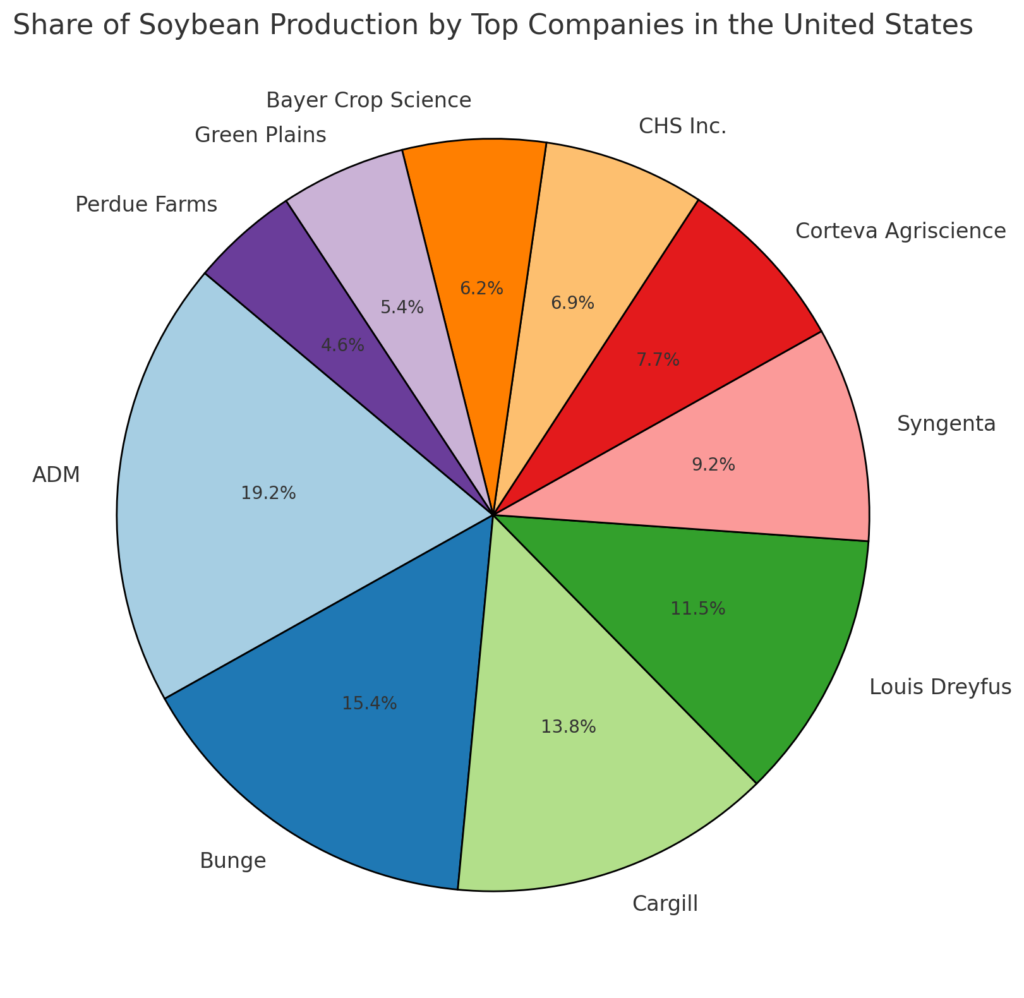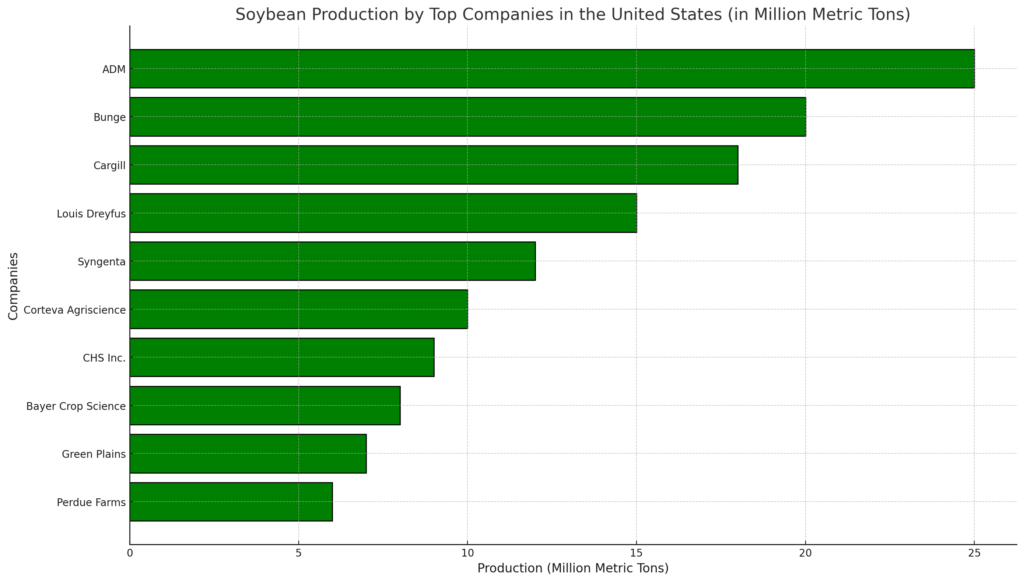Soybeans are a cornerstone of U.S. agriculture, contributing significantly to the country’s export economy and domestic supply chains. Leading companies dominate the U.S. soybean industry, leveraging advanced farming practices, robust logistics, and strong market demand. This report highlights the top 10 soybean-producing companies in the United States, detailing their operations and industry contributions.

1. Archer Daniels Midland (ADM)
- Headquarters: Chicago, Illinois
- Overview: ADM is one of the largest agribusinesses in the U.S., playing a central role in soybean production and processing.
- Key Highlights:
- Operates numerous processing plants across the Midwest.
- Produces soybean meal, oil, and biodiesel for domestic and export markets.
- Focuses on sustainability through partnerships with farmers.
2. Bunge North America
- Headquarters: St. Louis, Missouri
- Overview: A global agribusiness giant, Bunge is a leader in soybean processing and export.
- Key Highlights:
- Operates large-scale crushing plants in key soybean-producing states.
- Supplies soybean products to food, feed, and industrial sectors.
- Focuses on reducing deforestation in its supply chains.
3. Cargill
- Headquarters: Minneapolis, Minnesota
- Overview: Cargill is a major player in the U.S. soybean industry, with operations spanning farming, processing, and exporting.
- Key Highlights:
- Operates numerous soybean crushing facilities across the U.S.
- Processes soybeans into meal, oil, and other derivatives for global markets.
- Invests in sustainable agriculture and renewable energy initiatives.
4. Louis Dreyfus Company (LDC)
- Headquarters: Wilton, Connecticut
- Overview: LDC operates as a key player in the U.S. soybean market, focusing on processing and exports.
- Key Highlights:
- Processes millions of tons of soybeans annually for meal and oil production.
- Supplies to global markets, especially in Europe and Asia.
- Emphasizes sustainability in its operations.
5. Syngenta U.S.
- Headquarters: Greensboro, North Carolina
- Overview: Syngenta specializes in agricultural innovation, providing seeds and crop protection solutions.
- Key Highlights:
- Develops high-yield, genetically modified soybean seeds.
- Works with farmers across the Midwest to boost production efficiency.
- Focuses on resilience to climate change.
6. DuPont Pioneer (Now Corteva Agriscience)
- Headquarters: Wilmington, Delaware
- Overview: A leader in agricultural biotechnology, Corteva offers advanced soybean seed solutions.
- Key Highlights:
- Provides farmers with genetically engineered seeds to increase yields.
- Partners with farmers nationwide to implement precision agriculture techniques.
- Focuses on sustainability and soil health improvement.
7. CHS Inc.
- Headquarters: Inver Grove Heights, Minnesota
- Overview: CHS is a farmer-owned cooperative and one of the largest soybean exporters in the U.S.
- Key Highlights:
- Operates crushing plants and grain terminals across soybean-producing regions.
- Supplies soybean meal and oil to domestic and global markets.
- Focuses on empowering farmer-members through advanced technology and resources.
8. Monsanto (Now Bayer Crop Science)
- Headquarters: St. Louis, Missouri
- Overview: Monsanto, now part of Bayer, revolutionized the soybean industry with its genetically modified seeds.
- Key Highlights:
- Introduced herbicide-resistant soybean varieties.
- Works with farmers to optimize production and address pest challenges.
- Emphasizes innovation and sustainable agricultural practices.
9. Green Plains Inc.
- Headquarters: Omaha, Nebraska
- Overview: Green Plains is a leading producer of soybean-based biofuels and high-protein animal feed.
- Key Highlights:
- Processes soybeans into biodiesel and ethanol co-products.
- Invests in renewable energy technologies to support sustainable agriculture.
- Expands production capacity to meet growing domestic and global demand.
10. Perdue Farms
- Headquarters: Salisbury, Maryland
- Overview: Perdue Farms is a significant player in soybean processing for animal feed.
- Key Highlights:
- Sources soybeans for poultry and livestock feed production.
- Focuses on sustainable and organic farming practices.
- Operates facilities in key soybean-producing states like Iowa and Illinois.

Key Contributions of U.S. Soybean Producers
- Global Supply Chains: U.S. soybean producers are key suppliers to China, the European Union, and Southeast Asia.
- Technological Advancements: Companies like Syngenta and Corteva lead the way in agricultural innovation.
- Sustainability: Industry leaders invest heavily in sustainable farming practices, including soil health and water conservation.
Challenges Facing the U.S. Soybean Industry
- Trade Disputes: Tariffs and trade restrictions impact export volumes.
- Climate Change: Unpredictable weather patterns threaten yields.
- Competition: Rising competition from Brazil and Argentina in global markets.
Opportunities for Growth
- Renewable Energy: Increasing demand for biodiesel creates new markets for soybean products.
- Sustainability Initiatives: Strengthening sustainable farming practices can attract eco-conscious buyers.
- Value-Added Products: Expanding production of processed soybean products like protein isolates and oils.
Conclusion
The top soybean-producing companies in the U.S., including ADM, Bunge, and Cargill, play a critical role in global agriculture. With their focus on innovation, sustainability, and market expansion, these companies are poised to maintain their leadership in the soybean industry. As global demand continues to rise, U.S. agribusinesses will remain key players in meeting the world’s food and energy needs.

